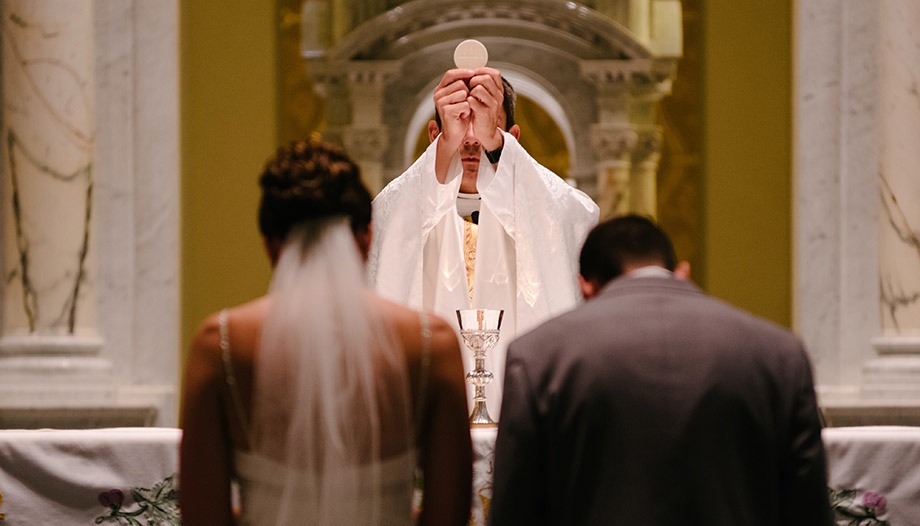"Marriage: one flesh, given and received," is the theme for Marriage Week 2023 and highlights the union of spouses into one flesh.
Marriage is the image of Christ's love for his Church. "Spouses are called to give themselves fully to each other, just as Christ gave himself to his Church," the Pastoral Letter notes. Marriage. Love and life in the divine plan.The United States Conference of Catholic Bishops, which emphasizes how "The married couple forms an image of the Trinitarian God. Like the Holy Trinity, marriage is the communion of love between persons equal to each other: husband and wife."
– Supernatural National Marriage Weekwhich was born in 2010, aims to reflect on the gift of marriage. In this sense, it aims to offer tools for spouses and resources for young people to discover the vocation to marriage.
In this regard, a survey conducted by Georgetown University's Center for Applied Research in the Apostolate (CARA) indicates that from 1975 to 2021, the number of marriages has been steadily declining in the United States.
According to CARA, in 2021, of the 66.8 million Catholics in the country, 54% are married; 11% divorced and 21% never married.
Marriage problems
In their Pastoral Letter on Marriage, the U.S. bishops highlight the four major challenges facing this sacrament: cohabitation, contraception, same-sex unions and divorce.
On the first point, many young Americans choose to cohabit with their partner for various reasons, including economic ones; some never marry either in church or before a civil authority.
The central problems with them are not the "costs" or donations related to a wedding, but the lack of knowledge of the marriage vocation and the absence of catechesis.
Faced with this reality, the U.S. bishops launched in 2004 the National Pastoral Initiative on Marriagean effort to promote, preserve and protect marriage.
The results of that effort were, among others, a Pastoral Letter and the issuance of guidelines or policies for marriage preparation in North American dioceses.
Its objective is to strengthen marriage in the Church through pastoral care and catechetical formation before and after marriage.
Each diocese, at the direction of the bishop, adopts, modifies or expands these policies. However, most dioceses have consistently adopted such guidelines for marriage preparation.
Preparation for the sacrament of marriage in the United States
The central nucleus of marriage preparation is catechesis and pre- and post-marriage accompaniment. In the first phase, once the first contacts with the parish priest have been initiated, after ascertaining the freedom and absence of impediments of the engaged couple, the catechetical phase begins, which consists of pre-marriage meetings, retreats, the completion of a "pre-marriage study" and the accompaniment of the parish priest and other experienced couples.
The "premarital study"is a tool through which a series of questions about various aspects of marriage are applied.
It is not a marriage test, nor a psychological evaluation. It is an instrument that allows the engaged couple to get to know each other better and explore areas that may be unknown or obscure. It addresses issues such as child rearing, faith life, financial management, or future projects. Subjects that, perhaps at an initial moment for the lovers might seem irrelevant, but that have been the cause of marriage annulments and civil divorce.
For the premarital study almost all dioceses use FOCCUS, which translates as "Facilitating Communication, Understanding and Couple Study" and the Premarital Study, PMI.
Another tool in the process of marriage preparation is the pastoral care. The pastor or a permanent deacon accompanies the couples in all phases of preparation.
In many dioceses there are also apostolates for married couples. These are married couples who have been married for several years, committed to the parish, to the family and who have been called to help other couples. They receive catechetical and pastoral training before beginning their apostolate.
This accompaniment of other married couples is essential for the newlyweds not only before, but also after marriage, because, having gone through the vicissitudes of marriage, they can offer practical advice to the newlyweds on how to face the difficulties of this state of life and emerge stronger.
Resources for marriages
During National Marriage Week, the United States Conference of Catholic Bishops makes available digital resources, in social networks Twitter, Facebook in English and Instagram There is also a Spanish-language website called For your Marriage which contains a variety of tools. Among them, a marriage retreat for the home, catechetical videos on the sacrament, the pastoral letter on marriage in Spanish, prayers and liturgical suggestions for the celebration of National Marriage Week and World Marriage Day on Sunday, February 12, 2023.








